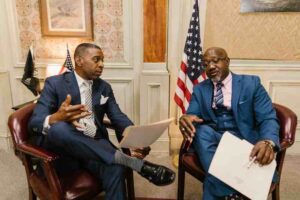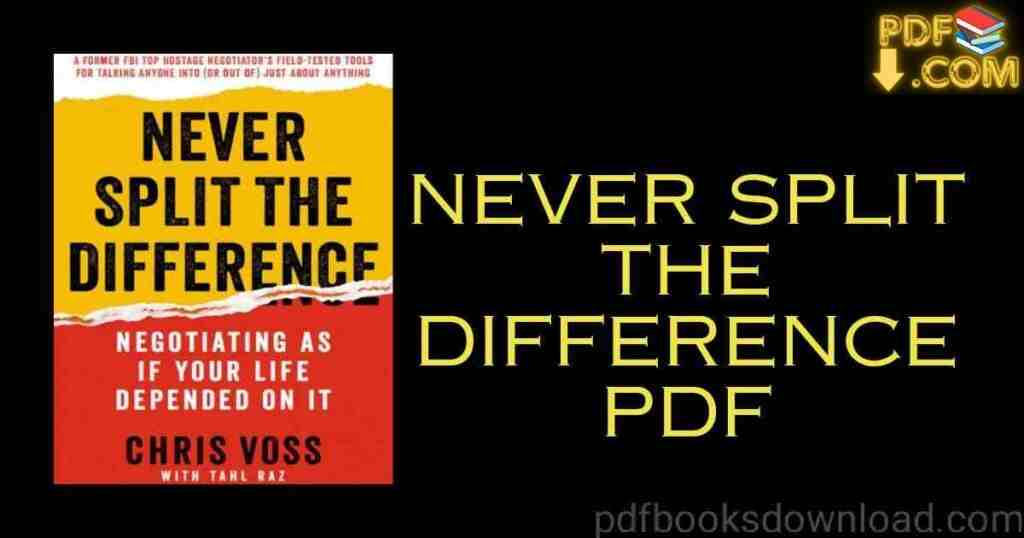| Name of Book | Never Split The Difference |
| Author | Chris Voss |
| PDF Size | 1.5 MB |
| No of Pages | 375 |
| Language | English |
Five Reasons To Read Never Split The Difference PDF
Master Negotiation Skills: Voss, a former FBI hostage negotiator, shares practical negotiation tactics honed through real-life high-stakes situations. Readers can learn valuable strategies applicable to various aspects of life, from business deals to personal relationships.
Empathy and Understanding: The book emphasizes the importance of empathy and understanding in negotiations. Voss teaches readers how to effectively listen and empathize with the other party’s perspective, leading to more mutually beneficial outcomes.
Psychological Insights: Through engaging anecdotes and psychological insights, Voss reveals the hidden dynamics at play in negotiations. Readers gain a deeper understanding of human behavior and how to leverage it to their advantage.
Practical Techniques: “Never Split the Difference” offers practical techniques that anyone can implement, regardless of their experience level. From tactical empathy to mirroring and labeling, Voss provides actionable strategies for achieving better results in negotiations.
Applicability to Various Situations: Whether you’re negotiating a salary raise, buying a car, or resolving a conflict, the principles outlined in the book can be applied to a wide range of situations. Readers can immediately start applying Voss’s techniques to improve their negotiation outcomes in both professional and personal contexts.

Never Split the Difference Summary
Introduction:
“Never Split the Difference” by Chris Voss is a compelling guide to negotiation strategies based on Voss’s experiences as a former FBI hostage negotiator. With insights garnered from high-stakes negotiations, Voss offers practical techniques applicable in various real-life scenarios, from business deals to personal interactions. This SEO-friendly summary delves into the key principles outlined in each of the book’s ten chapters, providing a detailed overview along with actionable advice for implementation.
The New Rules
In this opening chapter, Voss introduces the concept of tactical empathy, emphasizing the importance of understanding the emotions and perspectives of the opposing party in negotiations. He stresses the need to prioritize listening over speaking and highlights the effectiveness of open-ended questions in gathering valuable information.
Be a Mirror
Voss explores the power of mirroring, a technique used to establish rapport and build trust with the other party. By subtly imitating the person’s speech patterns, gestures, and expressions, negotiators can create a sense of connection and foster a cooperative atmosphere conducive to successful outcomes.
Don’t Feel Their Pain, Label It
This chapter delves into the strategy of labeling, which involves acknowledging and verbalizing the emotions expressed by the other party. By articulating their feelings, negotiators validate the emotions while maintaining control of the conversation, leading to better understanding and collaboration.
Beware “Yes,” Master “No”
Voss explains the significance of eliciting “no” responses during negotiations to encourage honesty and engagement. By prompting the other party to voice their objections and concerns, negotiators gain valuable insights into their priorities and preferences, paving the way for mutually beneficial agreements.
Activate the Dynamic Duo That Instantly Elevates Every Negotiation.
Highlighting the impact of the phrases “That’s right” and “You’re right,” Voss demonstrates how affirming the other party’s perspective can foster agreement and cooperation. By acknowledging their validity, negotiators validate the other party’s feelings and create a sense of unity, leading to more favorable outcomes.
Bend Their Reality
Voss explores the concept of “bending reality,” which involves reframing the narrative and shaping the other party’s perception of the situation. By presenting alternative perspectives and challenging assumptions, negotiators can influence decision-making and steer discussions toward mutually beneficial resolutions.
Create the Illusion of Control
This chapter focuses on the psychology of control and the importance of empowering the other party to feel in command of the negotiation process. By offering controlled choices and autonomy, negotiators can alleviate resistance and increase the likelihood of reaching agreements that satisfy both parties.
Guarantee Execution
Voss emphasizes the significance of ensuring follow-through and accountability in negotiations. By establishing clear commitments and deadlines, negotiators can mitigate the risk of misunderstandings and uphold the integrity of the agreements reached, fostering trust and long-term relationships.
Bargain Hard
In this chapter, Voss discusses the art of strategic bargaining and the importance of setting ambitious goals while remaining flexible and adaptable. By leveraging concessions and prioritizing value over price, negotiators can maximize outcomes and secure advantageous deals that align with their objectives.
Find the Black Swan
Voss concludes by encouraging negotiators to remain vigilant and adaptable in their approach, anticipating unexpected developments and leveraging hidden opportunities to their advantage. By embracing uncertainty and embracing ambiguity, negotiators can navigate complex situations with confidence and achieve exceptional results.
Practical Application:
Implementing the principles outlined in “Never Split the Difference” can significantly enhance negotiation skills and improve outcomes in various real-life scenarios. By actively listening, mirroring, and labeling emotions, individuals can establish rapport and build trust with counterparts, fostering open communication and collaboration.
Additionally, mastering the art of eliciting “no” responses, affirming perspectives, and reframing narratives can help navigate conflicts and reach mutually beneficial agreements. By incorporating these strategies into negotiations, individuals can effectively manage difficult conversations, overcome obstacles, and achieve successful outcomes in both professional and personal settings.
Conclusion:
“Never Split the Difference” offers invaluable insights and practical techniques for mastering the art of negotiation, drawing from Chris Voss’s extensive experience as an FBI hostage negotiator. By prioritizing empathy, communication, and strategic thinking, individuals can apply these principles to navigate complex negotiations with confidence and achieve favorable outcomes.
Whether in business transactions, interpersonal relationships, or high-stakes scenarios, the strategies outlined in this book empower negotiators to effectively influence decisions, build trust, and secure mutually beneficial agreements. For more information click.

About The Author Of Never Split The Difference
Chris Voss, the author of the renowned book “Never Split the Difference,” is a former FBI hostage negotiator who brings years of experience and expertise to the realm of negotiation. Born and raised in Iowa, Voss embarked on his career in law enforcement after graduating from Harvard University with a degree in International Studies.
His journey into negotiation began during his time as a police officer in Kansas City, where he honed his skills in communication and conflict resolution. In 1986, Voss joined the FBI, where he quickly rose through the ranks and became the lead international kidnapping negotiator. Throughout his tenure with the FBI, Voss successfully negotiated with some of the world’s most dangerous criminals and terrorists, earning a reputation for his innovative tactics and ability to diffuse high-stakes situations.
After retiring from the FBI, Voss founded The Black Swan Group, a consulting firm that specializes in negotiation training and coaching. Drawing from his extensive experience in hostage negotiation, Voss developed the “Never Split the Difference” methodology, which emphasizes empathy, active listening, and tactical empathy in negotiations.
Voss’s book, “Never Split the Difference,” has received widespread acclaim for its practical insights and actionable strategies. Through real-life anecdotes and practical advice, Voss teaches readers how to negotiate effectively in any situation, whether it’s in business, personal relationships, or everyday interactions.
Beyond his work as an author and consultant, Voss is also a sought-after speaker who has delivered keynote addresses and workshops around the world. He continues to share his expertise through podcasts, interviews, and training programs, helping individuals and organizations achieve better outcomes through the power of negotiation.
Never Split The Difference PDF Related Books
FAQ’s About Never Split The Difference

What is “Never Split the Difference” about?
“Never Split the Difference” is a book written by Chris Voss, a former FBI hostage negotiator. It explores negotiation tactics and strategies based on real-life experiences, offering insights into effective communication and persuasion in both personal and professional settings.
What sets Never Split The Difference apart from the other Self-Helps on Negotiations?
Unlike traditional negotiation techniques that focus solely on compromise, Voss’s approach emphasizes empathetic listening, emotional intelligence, and tactical empathy to achieve better outcomes without compromising.
Can the strategies in “Never Split the
Difference” be applied to everyday situations?
Yes, the negotiation tactics outlined in the book are applicable to various situations, including business deals, salary negotiations, conflict resolution, and even interpersonal relationships.
What is “tactical empathy,” and how does it work in negotiation?
Tactical empathy involves understanding the emotions and perspectives of the other party to build rapport and influence their decisions. It helps negotiators create a collaborative atmosphere and uncover valuable information.
Are the techniques in “Never Split the Difference” ethical?
Yes, the techniques presented in the book prioritize ethical negotiation practices, emphasizing honesty, integrity, and respect for both parties’ interests. They focus on creating mutually beneficial agreements rather than exploiting weaknesses or manipulating emotions.
Can “Never Split the Difference” help introverts become better negotiators?
Absolutely. The strategies in the book are not solely reliant on extroverted behavior but rather on effective communication and understanding of human psychology, making them suitable for introverts as well.
Does “Never Split the Difference” provide actionable advice or theoretical concepts?
The book offers practical techniques backed by real-world examples and exercises to help readers implement the strategies in their own negotiations. It emphasizes hands-on application rather than abstract theory.
How can business professionals benefit from the principles outlined in “Never Split the Difference”?
Business professionals can use the tactics in the book to improve deal-making, sales negotiations, client interactions, conflict resolution, and leadership skills, ultimately enhancing their overall effectiveness in the workplace.
Are the negotiation tactics in “Never Split the Difference” effective in cross-cultural contexts?
Yes, the principles of empathy, active listening, and rapport-building transcend cultural boundaries and can be adapted to various cultural norms and communication styles, making them applicable in diverse settings.
Does the book”Never Split the Difference” be beneficial in personal relationships?
Absolutely. The book’s emphasis on empathy, effective communication, and understanding human behavior can improve relationships by fostering deeper connections, resolving conflicts, and strengthening trust and rapport.
Thank You! Dear Reader 💖
